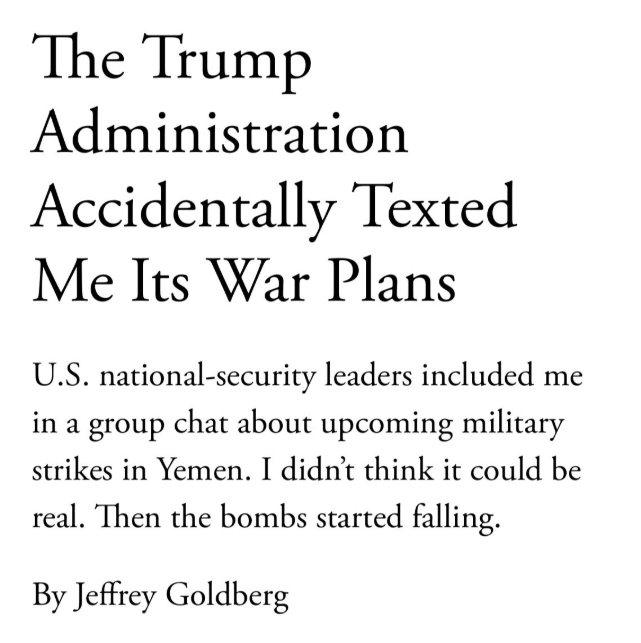NEW DELHI: The Trump administration faced an unprecedented lapse of national security when it inadvertently included The Atlantic editor-in-chief, Jeffrey Goldberg, in a Signal group chat discussing classified military strikes on Yemen.
The group chat, involving Vice President JD Vance, Defense Secretary Pete Hegseth, and National Security Advisor Mike Waltz, debated critical strategic moves. The breach was confirmed when the plans discussed in the chat materialized shortly thereafter.
Goldberg, reflecting on the incident, stated, “This is a shocking breach of national security. Such mishandling of sensitive information could have had grave consequences if accessed by adversaries.” His sentiments were shared by security experts, who pointed out the administration’s failure to adhere to proper communication protocols for classified discussions.

Vice President JD Vance acknowledged the mistake, describing it as “an unfortunate oversight,” while reiterating that national security remained the administration’s top priority. He added, “We are committed to ensuring such lapses never happen again.” Vance, however, defended the mission discussed in the chat, emphasizing its necessity to protect American interests. “While the operation’s timing was debated, decisive action was required,” he said.
Defense Secretary Pete Hegseth echoed Vance’s concerns about the oversight but stood firm on the mission’s importance. “This lapse is regrettable, but it does not overshadow the critical need to address the threats we face. Our actions were both necessary and effective,” Hegseth remarked.
National Security Advisor Mike Waltz, believed to have mistakenly added Goldberg to the group chat, described the incident as “an operational misstep” and assured the public of measures being put in place to prevent similar incidents. “We are reviewing and updating our protocols to ensure the integrity of sensitive communications,” Waltz stated.
BREAKING: The Trump admin accidentally texted a journalist, Jeffrey Goldberg, from The Atlantic, their top-secret war plans on Yemen.
Texts are below between Vance and Hegseth, in which the journalist was included.
Imagine if Biden did this! So incompetent. pic.twitter.com/CGIkNq0iNX
— Brian Krassenstein (@krassenstein) March 24, 2025
The National Security Council also weighed in, with spokesperson Brian Hughes defending the operation’s success. “Despite the error, the operation was carried out flawlessly, with no risks to personnel or national security,” he explained.
ALSO READ: Eknath Shinde calls Kamra’s satire a “Hit job done for money.”
President Donald Trump, however, dismissed concerns surrounding the breach, saying, “I don’t know anything about it. The Atlantic isn’t much of a magazine. To me, it’s not a big story.” His remarks have drawn criticism, with many accusing him of undermining the gravity of the situation.
The incident has sparked strong reactions from political leaders. Senate Minority Leader Chuck Schumer called it “one of the most egregious breaches of military intelligence in recent history” and demanded a thorough investigation. The mishap has also raised questions about the administration’s approach to handling classified information and strained ties with allies, as the chat discussions reportedly implicated European stakeholders.
As investigations continue, this breach serves as a sobering reminder of the critical importance of secure communication in safeguarding national security.










